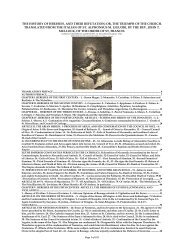The Writings of St. Francis of Assisi - + Saints' Works
The Writings of St. Francis of Assisi - + Saints' Works
The Writings of St. Francis of Assisi - + Saints' Works
Create successful ePaper yourself
Turn your PDF publications into a flip-book with our unique Google optimized e-Paper software.
THE WRITINGS OF ST. FRANCIS OF ASSISI<br />
<strong>The</strong> fourth Latin term is infirmus. It should be noted that throughout his writings, <strong>St</strong>.<br />
<strong>Francis</strong> never uses the Latin word aegrotus "sick" (one who suffers from a disease), but rather the<br />
Latin word infirmus "infirm" (one who is weak in body). In this he is making a distinction which<br />
fosters respect not only for those who are ill but also for the aged and poor in health, which<br />
distinction is vital in the government <strong>of</strong> a community <strong>of</strong> men who make a life-long promise.<br />
However, since in English the word "infirm" is used as a predicate adjective or a substantive,<br />
"sick" has been chosen to translate the other usages <strong>of</strong> infirmus. <strong>The</strong> English reader therefore<br />
should take note, not to construe this usage <strong>of</strong> "sick" in the standard fashion, when reading this<br />
translation.<br />
<strong>The</strong> fifth term is really two Latin words: reddo and refero. <strong>The</strong> former means "to restore,<br />
to render," and the latter "to return, to refer." <strong>St</strong>. <strong>Francis</strong> uses the first in regard to restoring unto<br />
God the honor and glory, praise and thanks that are His due; and the second, in regard to man's<br />
duty to refer unto God all thanks and praise for the good things <strong>of</strong> this world. In this translations<br />
the former will always be translated with the English word "render" and the latter with the<br />
English word "return."<br />
<strong>The</strong> sixth term is really three Latin words: amor, dilectio, caritas. In English these can<br />
each be translated by the word "love." However this is problematic, for the Latin terms have<br />
distinct meanings, and as such merit differing English words if their sense is to be manifested in<br />
translation. For this reason the following arrangement has been chosen for utility's sake. <strong>The</strong><br />
Latin term caritas, will be always translated by the English word "charity" (or other forms such<br />
as "charitable") which, however, is meant here, not in the sense <strong>of</strong> an alms or donation, but <strong>of</strong><br />
that supernatural form <strong>of</strong> love that moves one to give <strong>of</strong> himself or <strong>of</strong> his possessions to another.<br />
<strong>The</strong> other Latin terms have similar meanings: amor is <strong>of</strong>ten used to signify a natural, human, or<br />
sensible love, as well as that love which unites one person to another, and dilectio, the love that<br />
proceeds from a rational and free choice and which results in delight in another person. Thus <strong>St</strong>.<br />
<strong>Francis</strong> speaks <strong>of</strong> the amor Christi which urges us to follow and serve Christ; while Christ in the<br />
Gospels speaks <strong>of</strong> His own dilectio for His disciples, to show that He has chosen to love us first,<br />
while we were yet sinners. Nevertheless, English has no single word to distinguish these two<br />
forms <strong>of</strong> love. Hence the Latin terms amor and dilectio, whether used in as nouns, adjectives,<br />
adverbs or verbs, will both be translated with the English word "love" (or other forms such as<br />
"loving," "lovable," etc.). However to clarify <strong>St</strong>. <strong>Francis</strong>' usage, in each <strong>of</strong> his writings, the first<br />
instance <strong>of</strong> each term will be indicated in round ( ) brackets with the root Latin word. <strong>The</strong>reafter<br />
the Latin term will only appear in brackets if <strong>St</strong>. <strong>Francis</strong>' switches between them. In this manner<br />
both the English reader and the student <strong>of</strong> <strong>St</strong>. <strong>Francis</strong>' theology <strong>of</strong> love will find the Saint's<br />
teaching accessible.<br />
<strong>The</strong> seventh term is really four Latin prepositions: de, ex, pro, and propter, which are<br />
<strong>of</strong>ten used in Latin to express the relation between an action and some cause, event or<br />
circumstance. <strong>The</strong>ir meanings in Latin are derived from their use in spatial relations: de (down<br />
from), ex (out <strong>of</strong>), pro (in front <strong>of</strong>), propter (near by). To manifest this precision <strong>of</strong> expression, a<br />
consistent approach will be taken in translation, in which the English "because <strong>of</strong>," "from," "on<br />
behalf <strong>of</strong>," and "on account <strong>of</strong>" will be employed, respectively, in this regard. <strong>The</strong> only exception<br />
being the use <strong>of</strong> the Latin propter to express the intention or goal <strong>of</strong> an action; in that case it will<br />
be translated with the English phrase "for the sake <strong>of</strong>."<br />
Finally, it should be noted that since <strong>St</strong>. <strong>Francis</strong>' use <strong>of</strong> language to convey obligation is<br />
at the heart <strong>of</strong> the purpose <strong>of</strong> nearly all his writings, some remark is necessary to clarify the<br />
precise translation <strong>of</strong> the Latin hortatory subjunctive into English. Throughout the Saint's<br />
writings one finds the present subjunctive used predominately for the purpose <strong>of</strong> instructing his<br />
Page - 17













